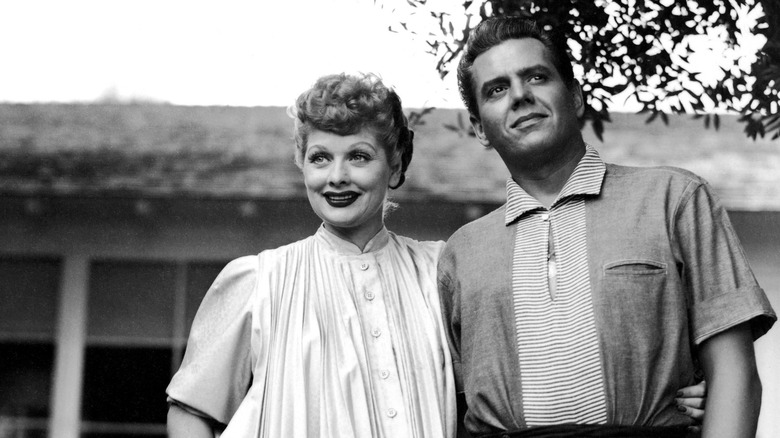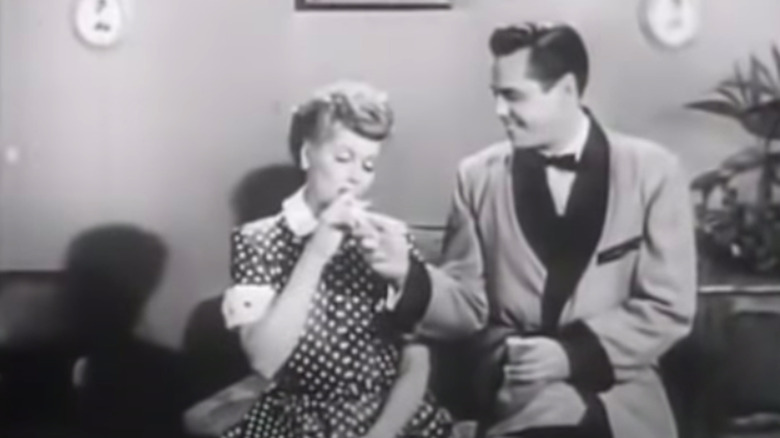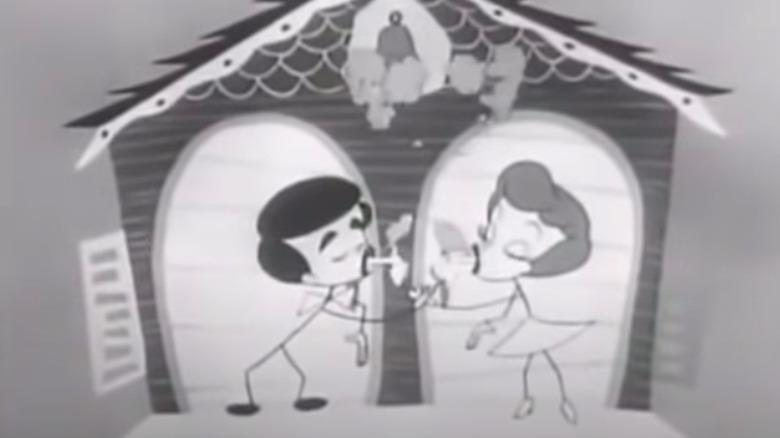I Love Lucy Signed A Smoky Deal And Wound Up With A Deadly Sponsorship
For four of its legendary six seasons, "I Love Lucy" was the most-watched show on American television. The real-life husband–and-wife combination of Lucille Ball and Desi Arnaz was a sitcom match made in heaven from jump, and the series continues to air in (what remains of) syndication to this day.
It didn't take long for "I Love Lucy" to find a massive, devoted audience, but the interracial pairing of the very Caucasian Ball with the Cuban-born Arnaz turned off most potential advertisers. The CBS show desperately needed a major sponsor, so when the tobacco giant Philip Morris stepped up, they gladly took the corporation's money. In fact, they were so grateful for the support, that the stars personally, and eagerly, plugged the company's cigarettes in extended commercials before and during each episode.
These ads didn't stick with the show when it moved to syndication (televised cigarette ads were banned from the airwaves in 1970), but they were brought back for the series' 2014 Blu-ray release (replete with the warning "We do not recommend smoking, which causes lung cancer and other diseases"). Personally, I'm all for preserving problematic elements of films and shows; you can't scrub the parts of history you don't like. But when I tell you these Lucy and Desi ads are cringe-inducing, I fear I may be underselling their wanton creepiness.
Smooth, mild, mellow and easy on your throat!
There's a five-minute collection of these advertisements on YouTube, and the first clip might be the worst. After an animated bit featuring Lucy furnishing Desi with a pillow on his easy chair before switching on the television (there's nowhere for her to sit), we're treated to the live-action sight of the duo firing up a couple of king-sized sticks in their living room. Desi notes that this is the last cig in the pack, and asks Lucy to get another one. Rather than throw on her coat and drive to the local grocery store, Lucy hops up, takes down a framed picture in the background and unlocks a wall safe that contains a whole carton of Philip Morris goodness. Evidently, the couple's plans for the evening were to sit around the house and suck down darts until bedtime.
Upon retrieving the carton, Desi directly addresses the camera and marvels that they're "smooth, mild, mellow and easy on your throat." So smooth, you can't feel the cancer metastasizing in your lungs! Lucy adds that there's "no cigarette hangover." So when you're hacking up thick, yellowy phlegm in the morning, blame that on your nightcap or your toothpaste, not, god forbid, the pack-plus of coffin nails you inhaled the day before.
Lucy and Desi, perhaps unwittingly, helped hook the next generation of smokers
The joy of smoking is again celebrated in animated form — you know, for kids — in another ad that seems to advocate puffing on a butt before retiring in separate beds (because Ricky Jr. was apparently an immaculate conception). There's also a cameo from the company's spokesman, Johnny Roventini, who bellows his then-famous catchphrase "Call for Philip Morris!"
Most of the ads I watched had an animated element, which hammers home just how shamelessly tobacco companies courted children (and would continue to after the TV ban with cartoon characters like Joe Camel). The terribly unfunny punch line to Lucy and Desi's cigarette salesmanship is that Arnaz died of lung cancer at the age of 69 in 1986. It's a sad coda, one for which we'd lack such piercingly tragic context if CBS had opted to keep these irresponsible stashed away in the vault (like so many cartons of King-Sized Philip Morris smokes). It's infuriating how long we let the tobacco companies get away with this aggressive salesmanship.


